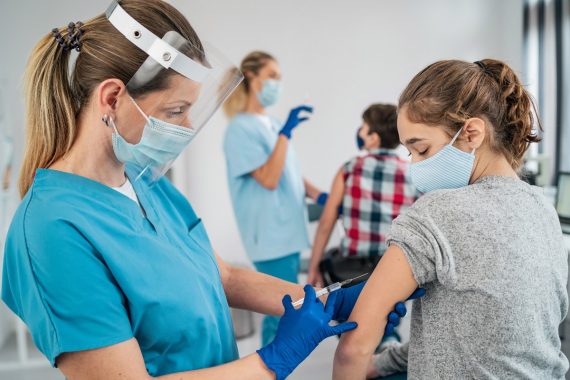GPs told to ensure remaining at-risk 12-15s get Covid vaccine by the end of this month

GPs have been given a deadline of Monday next week (27 September) to identify remaining vulnerable 12-15s, so they can receive their Covid jab by the end of the month (30 September).
The list of children identified as vulnerable to serious illness from Covid was recently extended to include those with poorly controlled asthma and type 1 diabetes, among a range of other conditions.
GPs have been asked to identify these children for priority vaccination, while a school-based campaign aims to vaccinate all healthy 12-15-year-olds before the October half term.
An NHS England letter to GPs, sent yesterday, said that new search tools have now been made available in the GP IT systems to help identify the 12-15s that were made eligible when the JCVI revised its guidance.
It added: ‘As it is not currently possible to identify eligible children and young people in this group nationally, we need all GP practices to run local searches to ensure that this additional small group of patients is offered the opportunity to receive their Covid-19 vaccination as soon as possible.’
Practices in PCN groupings administering jabs should invite identified vulnerable 12-15s for a vaccine ‘as soon as possible at their vaccination site’ and ‘by 30 September’ at the latest, the letter said.
Meanwhile, GP practices which are not participating in the vaccination programme should share a list of eligible patients with their local commissioner by 27 September, so they can arrange for them to be offered a vaccine elsewhere by the 30 September deadline.
Vulnerable children and their parents are also being advised to contact their GP to ‘discuss their eligibility’ if they believe they have been missed off the list.
NHS England said this comes as it ‘recognised’ that ‘not all eligible 12-15-year-olds may be identified through the GP record’.
GPs should consider eligibility using ‘clinical judgement’ and ‘in line with JCVI advice’, it added.
Hospitals can also refer 12-15s with underlying conditions for a Covid jab ‘if they consider them to be eligible’.
Meanwhile, CCGs must confirm by 1 October that all eligible 12-15s in the new ‘at risk’ group have been invited to book a jab.
The JCVI’s list of vulnerable children initially included those with severe neuro-disabilities; Down’s Syndrome; underlying conditions resulting in immunosuppression, profound and multiple learning disabilities (PMLD), severe learning disabilities or who are on the learning disability register.
Over-12s living with an immunosuppressed individual should also have been offered the vaccine.
But, following a consideration of updated data on 3 September, the JCVI expanded the list to include an approximate 200,000 extra children with haematological malignancy; sickle cell disease; type 1 diabetes; and congenital heart disease, among other conditions (see in full, below).
Meanwhile, the recently-confirmed Covid vaccination booster campaign has seen GPs given a 1 November target to jab care home patients and staff against Covid and flu.
In full: Covid-19 clinical risk groups for children aged 12 to 15 years
Chronic respiratory disease:
Includes those with poorly controlled asthma that requires continuous or repeated use of systemic steroids or with previous exacerbations requiring hospital admission, cystic fibrosis, ciliary dyskinesias and bronchopulmonary dysplasia.
Chronic heart conditions:
Haemodynamically significant congenital and acquired heart disease, or milder heart disease with other co-morbidity.
Chronic conditions of the kidney, liver or digestive system:
Includes those associated with congenital malformations of the organs, metabolic disorders and neoplasms, and conditions such severe gastro-oesophageal reflux that may predispose to respiratory infection.
Chronic neurological disease:
Includes those with:
- neuro-disability and/or neuromuscular disease including cerebral palsy, autism, epilepsy and muscular dystrophy
- hereditary and degenerative disease of the nervous system or muscles, or other conditions associated with hypoventilation
- severe or profound and multiple learning disabilities (PMLD), Down’s syndrome, or those on the learning disability register
- neoplasm of the brain
Endocrine disorders:
Includes diabetes mellitus, Addison’s and hypopituitary syndrome.
Immunosuppression:
Immunosuppression due to disease or treatment, including:
- those undergoing chemotherapy or radiotherapy, solid organ transplant recipients, bone marrow or stem cell transplant recipients
- genetic disorders affecting the immune system (for example, deficiencies of IRAK-4 or NEMO, complement disorder, SCID)
- those with haematological malignancy, including leukaemia and lymphoma
- those receiving immunosuppressive or immunomodulating biological therapy
- those treated with or likely to be treated with high or moderate dose corticosteroids
- those receiving any dose of non-biological oral immune modulating drugs – for example, methotrexate, azathioprine, 6-mercaptopurine or mycophenolate
- those with auto-immune diseases who may require long term immunosuppressive treatments
Asplenia or dysfunction of the spleen:
Includes hereditary spherocytosis, homozygous sickle cell disease and thalassemia major.
Serious genetic abnormalities that affect a number of systems:
Includes mitochondrial disease and chromosomal abnormalities.
Source: JCVI guidance updated 3 September 2021
Click to complete relevant paediatrics CPD modules on Pulse learning.
Visit Pulse Reference for details on 140 symptoms, including easily searchable symptoms and categories, offering you a free platform to check symptoms and receive potential diagnoses during consultations.
Related Articles
READERS' COMMENTS [3]
Please note, only GPs are permitted to add comments to articles












F.O.
I will do it when i have the time to do it. Until then – go hang.
Oh wait….you expected me to exercise some goodwill…go the exta 10 miles? Again?
I return to my opening comments…. F.O.
Blah. Think it’s all a bit blah at the moment. Shame GPs can’t do private work to “clear the backlog”, whereas Consultants can do, on the private wing of an NHS trust. Weird that. Blooming weird! What do you want next, 5% of the list referred to a Long covid clinic by mid-October? And 10% of the list having a prophylactic rectal examination and some questionnaire score out of 25 filled in? Trivial blah.
In any system at capacity, new work is at the expense of something else. What is it they suggest we drop instead of this?